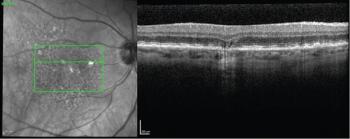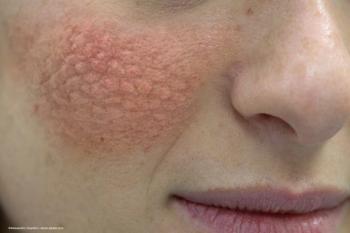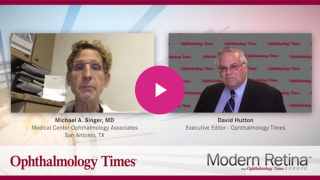
Ophthalmology
Latest News
Latest Videos

CME Content
More News

Anti-VEGF therapy for ROP has potential ocular and systemic advantages compared with laser but also noted that the systemic risks of anti-VEGF therapy in these infants need to be quantified.

MCO-010, an ambient-light activatable multi-characteristic opsin optogenetic monotherapy for vision restoration in blind patients, received fast track designation from the FDA.

The goal of World Sight Day, according to IAPB, is “to shine a light on blindness and vision impairment as a major, but solvable, public health issue."

Coordinated by the International Agency for the Prevention of Blindness (IAPB), the international day of awareness is a reminder to "love your eyes."

Vision loss and depression are common conditions with major health implications. However, the mechanism of that association remains to be clarified.

Investigators reported that intravitreal steroid injections were the bases for more cases of endophthalmitis compared with other intravitreal injections.

Tom Ruggia, President and CEO of Samsara Vision, provides updates on the lead asset for late-state age-related macular degeneration: Smaller-incision, new generation, implantable miniature telescope (SING IMT).

A combination of posters, podium presentations, and instructional courses provided invaluable revelations to the ophthalmic community.

The investigators undertook a study to determine the incidence of rhegmatogenous retinal detachments 1 year after cataract using the IRIS Registry data and to determine the demographic features, ocular comorbidities, and intraoperative factors associated with an increased risk of detachment development.

Patients with a unilateral rhegmatogenous retinal detachment frequently ask about the risk of developing an RRD in their fellow eye.

Those who used both traditional and electronic cigarettes reported severe to very severe ophthalmic symptoms.

The AVONELLE-X long-term extension study will continue to evaluate the efficacy, durability, and safety of faricimab in patients with neovascular AMD.

The data analysis showed that the macular thickness decreased across all time periods and in all macular regions for all tertiles.

Janssen noted that results from Phase 1/2 MGT009 study demonstrate safety profile of investigational gene therapy botaretigene sparoparvovec (AAV-RPGR) and suggest sustained vision improvement in patients with X-linked retinitis pigmentosa.

The results also showed that, compared to use of systemic antivirals alone, treatment with adjunctive intravitreal injections or early pars plana vitrectomy did not affect the time to development of retinal detachments.

Faricimab eradicates center-involved DME faster than aflibercept
The data analysis indicated that patients achieved robust visual gains and central subfield thickness reductions with faricimab dosed every 8 weeks and with PTI dosing up to every 16 weeks. The gains were sustained through year 2 of the trials.

At AAO 2022, Justis Ehlers, MD, presented a talk entitled, "Defining the Fluid Problem in Neovascular AMD: To Dry or Not to Dry?"

Almost 5 million patients in the IRIS Registry had received at least one diagnosis of DED between 2013 and 2019; of those, 203,171 were children under 18 years of age and 4,592,808 were adults.

Investigators reported that the safety and efficacy of the Tecnis Synergy IOL model ZFR00V indicates that it may be a good option for patients who desire meaningful gains in uncorrected visual acuity at all distances.

13% of pediatric patients had new-onset strabismus after a tube shunt procedure; in contrast, 0% of adults had new-onset strabismus after tube shunt surgery (at 6 months or at last follow-up).

Roger A. Goldberg, MD, MBA, discusses his 2022 AAO poster: "T&E-Based Personalized Treatment Interval Dynamics in the YOSEMITE/RHINE Trials of Faricimab in DME."

Investigators advise an ophthalmologic evaluation at the time of tumor diagnosis to detect early vision loss.

High-resolution multimodal imaging is key in dry AMD therapeutic development, future management
In an attempt to halt the progression of dry AMD and geographic atrophy, the use of high-resolution optical coherence tomography becomes pivotal.

This research team conducted a cross-sectional multicenter study to report the ocular fundus manifestations in infants with congenital ZIKV exposure in French Guiana, Martinique, and Guadeloupe, French West Indies.

The investigators emphasized that hydroxychloroquine doses of 5 mg/kg/day or less, in accordance with current ophthalmology and rheumatology guidelines, was associated with a higher risk of lupus flares, and the threshold was near 5 mg/kg/day.








































